Ranking The Best Marine Oil On The Market
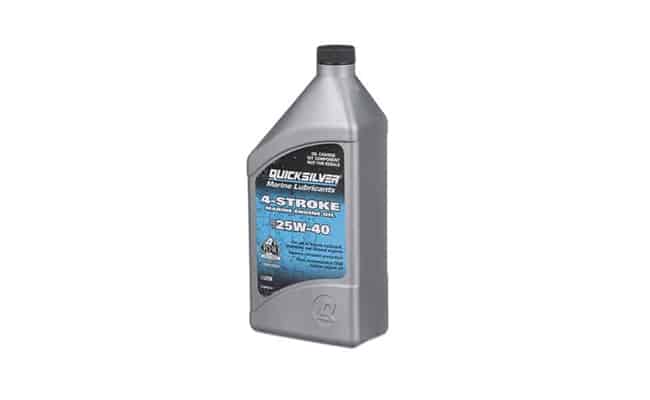
Quicksilver 4-Stroke EFI Marine Oil
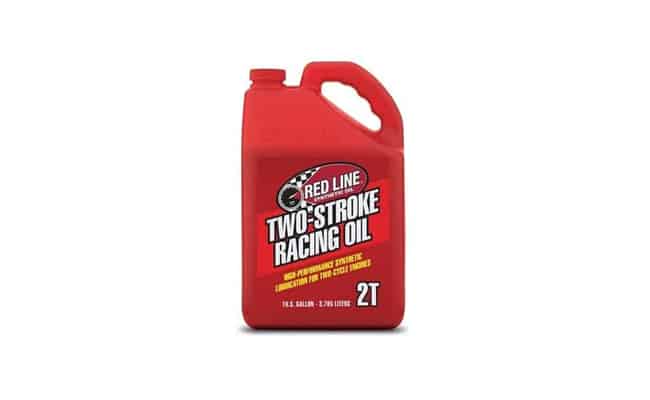
Red Line 40605 2-Stroke Race Oil
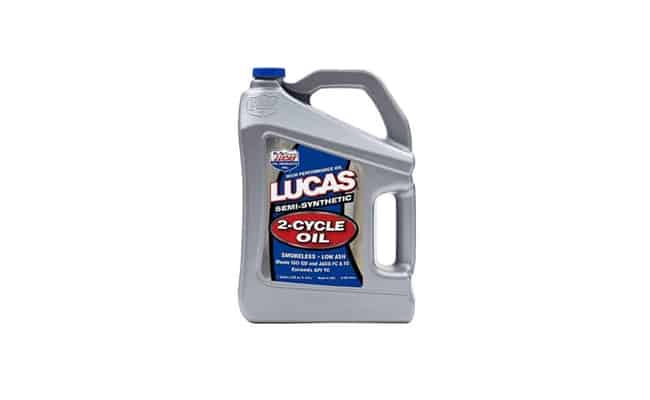
Lucas Oil Semi-Synthetic 2-Cycle Oil
If you want your boat’s engine to enjoy a long and productive life, you need to treat it with nothing less than the best marine oil that you can buy. Since your boat’s engine is the most important part of the vessel (aside from the hull, of course), it needs to be well taken care of and meticulously maintained. You can cut corners in a number of ways, but when it comes to your engine, don’t even think about it.
That means you should use a dedicated marine oil, and nothing else. As tempting as it might be to use the same oil that you’d use for you car, think again. Boat engines have very different oil specifications.
For a start, a marine engine requires an oil that can protect it from the effects of water, resisting rust and corrosion, and all the other problems that are caused by water. But that’s not all.
Marine engines operate differently too. They run harder and faster, often in the highest rev ranges. After that, they’re usually left alone for long stretches, unlike a car that’s used regularly. Dealing with these two extremes can take its toll on a boat engine, and that’s why you need specific marine products to keep your boat ship shape. And that goes for the engine too.
There are lots of different oils on the market, from two-stroke to four-stroke, with different weights and properties for a wide range of applications. So, to make life a little easier, we’ve drawn up a top list of the best boat oil products out there, with a buying guide to make sure that you buy the best oil for your engine. Here’s all you need to know.
Quicksilver 4-Stroke EFI Marine Oil
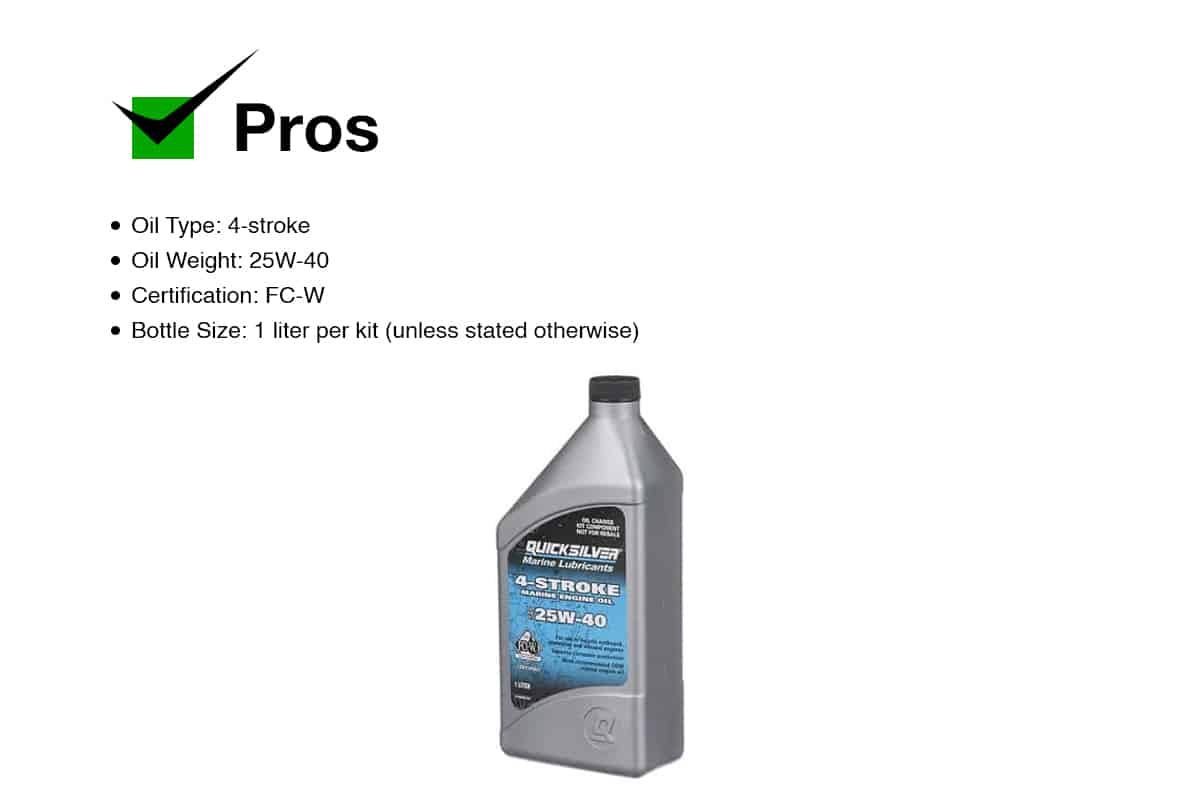
Quicksilver’s all-inclusive 4-stroke oil and changing kit is a great choice for easy marine oil changes. It’s an inexpensive kit that’s simple to use, convenient in nature, and perfect for all marine 4-stroke engines However it has been made with Mercury Mariner engines in mind. It’s available in three different configurations, to suit different engine sizes. These sizes include engines from 25 hp to 30 hp, engines between 40 hp and 60 hp, and for engines between 75 hp and 115 hp.
The actual oil is a 25W-40 engine oil that has been formulated with a number of additives to provide extra engine protection. Some of these additives include Quicksilver’s Flagship Protection formula, which features anti-wear properties that increases crankshaft protection by up to 33%.
Each kit comes with a variety of essential oil changing tools, including a bottle of marine oil, a new oil filter, a drain plug seal, a handy drip tray, and clear and concise instructions.
If you’re looking for an affordable all-inclusive oil changing kit from a reputable brand, then this Quicksilver 4-Stroke EFI Marine Oil kit is worth the money. Make sure that you purchase the correct kit for your engine type though, and read the customer reviews to ensure that the supplied oil filter or fuel filter is compatible with your motor.
Pros
Oil Type: 4-stroke
Oil Weight: 25W-40
Certification: FC-W
Bottle Size: 1 liter per kit (unless stated otherwise)
Red Line 40605 2-Stroke Race Oil
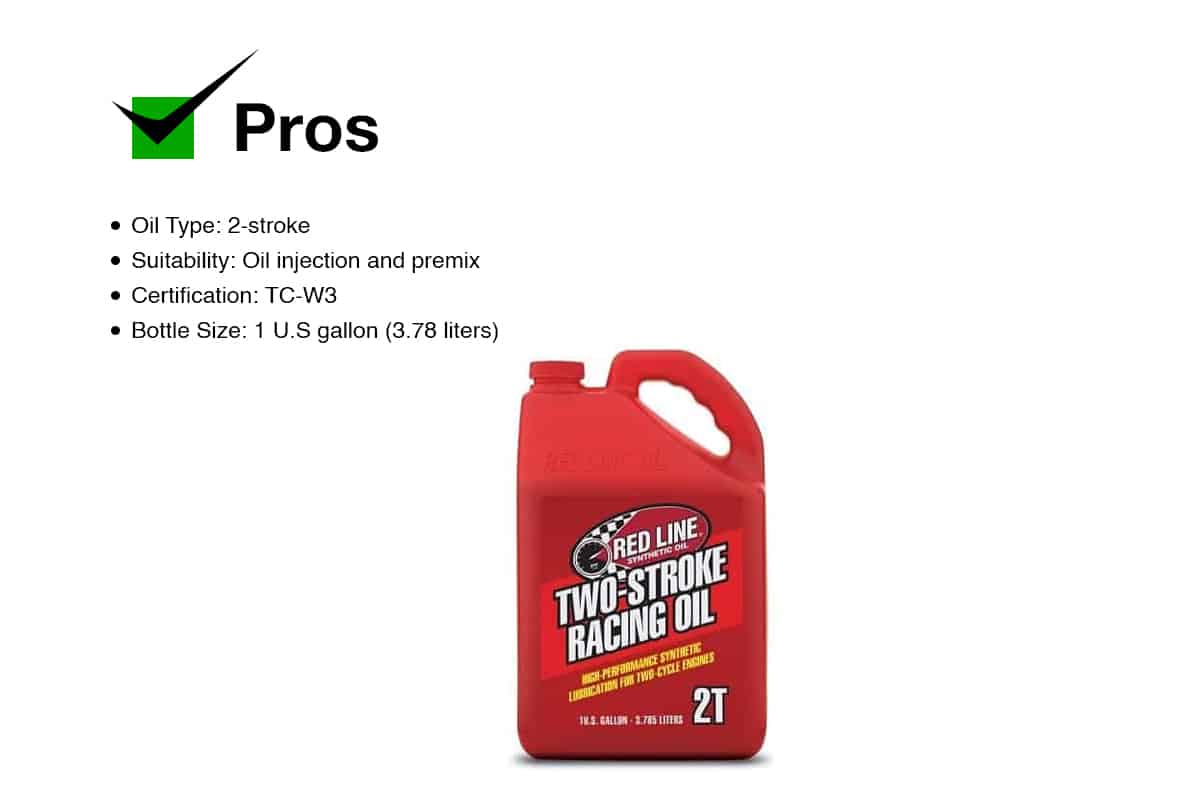
Next, we have another boat oil designed specifically for two-stroke motors. This is the 40605 race oil blend from Red Line. It’s a versatile oil that’s ideally suited to marine, motorcycle, ATV, and other powersports activities. This is a high-performance oil, and while it’s geared towards racing applications, it’s perfect for high-revving two-stroke marine motors.
This formula is a touch on the expensive side, but if you want the best performance out of your engine, with smooth running and top tier protection, this is worth the extra. It has been specially formulated for high-temperature stability, which is proven to produce gains and improvements of between 3 and 5 percent when compared with other oils.
In terms of protection, this marine oil can prevent the build-up of carbon around particularly susceptible areas of your engine, such as around the combustion chambers, piston rings, and exhaust ports. The result is an engine that can perform better, run smoother, and will last longer than others being serviced with other oils.
It burns clean, reduces smoking, and will help preserve your engine—and some of its perishables too, such as the spark plug and gaskets.
But performance like this isn’t cheap, and there’s no escaping the fact that this oil has a higher price tag than others. This is a great investment if you really want performance that sits at the business end of the spectrum. However, it might be overkill for the average boater.
Pros
Oil Type: 2-stroke
Suitability: Oil injection and premix
Certification: TC-W3
Bottle Size: 1 U.S gallon (3.78 liters)
Sierra 25W40 Boat Oil
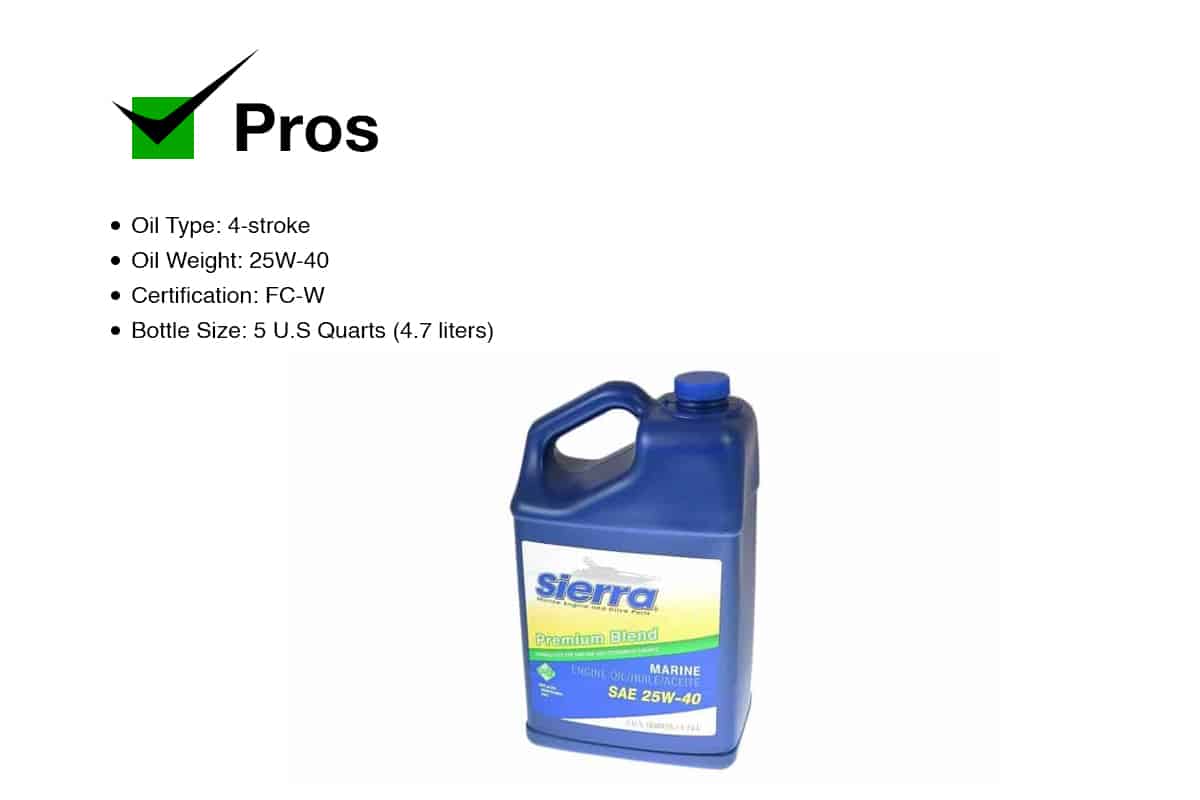
If you’re looking for an inexpensive marine oil that’s designed and engineered to improve the performance and prolong the life of an inboard engine with outdrive propulsion, then this formula from Sierra offers excellent value for money.
This reliable 4-stroke engine oil has a viscosity of 25W-40, and it has been specially formulated for inboard and stern drive engines. Don’t make the mistake of confusing this with outdrive lubricant, because it’s not the right tool for the job. This marine oil is excellent for a range of other applications though.
Despite the fact that this is a cheaper product, it does have a number of premium features. The most talked about one (and arguably the biggest strength of this oil) is that it runs clean even in cold temperatures—an area that many other oils have been known to fail in.
It can also handle high horsepower engines and all of the wear and tear that inevitably goes with them, and it can also handle itself well in a marine environment, which can be undoing of some cheaper priced oils.
Again, it’s a cheaper oil, but it has all of the necessary certifications, including the most important NMMA (National Marine Manufacturers Association) FC-W one. It ticks all the right boxes, and won’t leave your wallet empty either. You even get quite a lot of it for your money too!
Pros
Oil Type: 4-stroke
Oil Weight: 25W-40
Certification: FC-W
Bottle Size: 5 U.S Quarts (4.7 liters)
Mercury 4-Stroke Marine Engine Oil
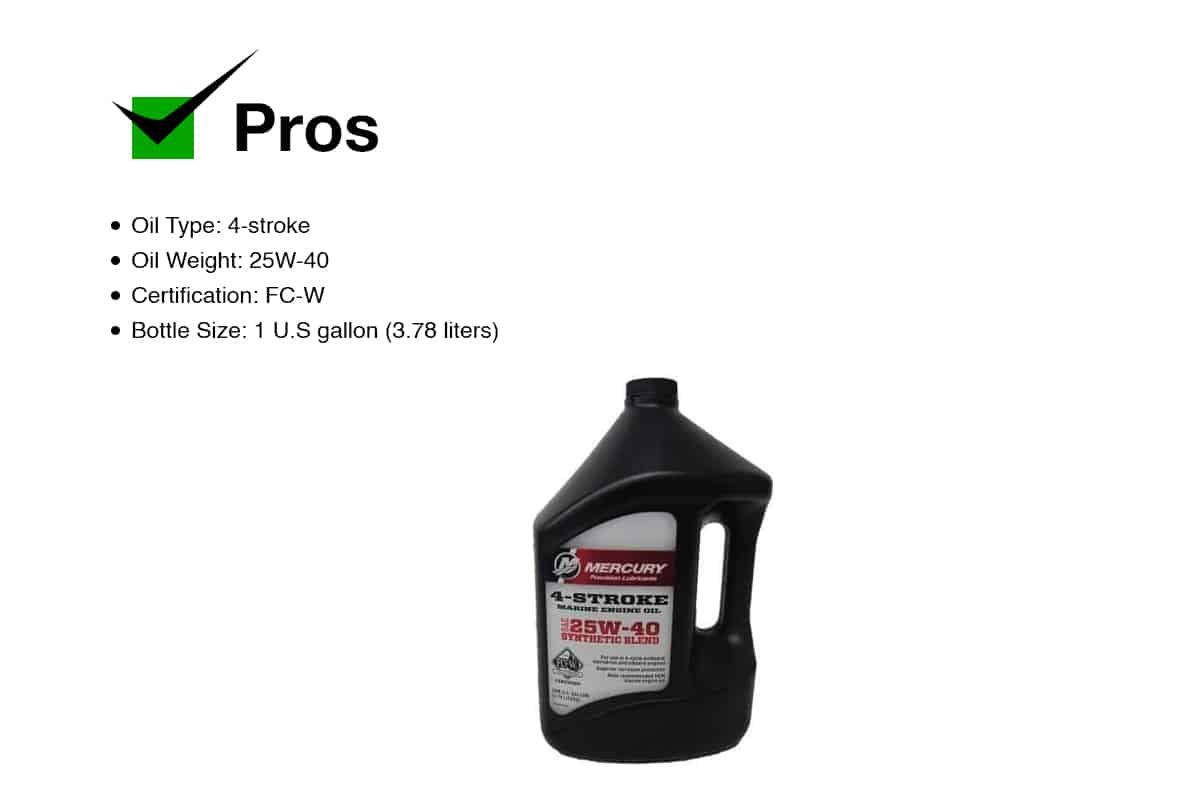
When it comes to marine engines Mercury know what they’re talking about. Mercury is one of the leading names in the industry, manufacturing quality marine engines. Whether you’re in the market for an outboard motor or an inboard engine, they’re a go-to brand. So it should come as no surprise that they manufacture their own line of engine oils and lubricants too.
This particular lubricant is a synthetic oil that has been developed specifically for four-stroke engines. It has a combination of synthetic blends and additives to provide the best lubrication and protection to gasoline engines. It successfully offers superior corrosions protection when compared with other boat engine oil products, which has made it one of the most highly recommended OEM marine oils in the business.
This is a 25W-40 synthetic blend oil designed for use in a wide range of marine applications, including outboard, stern drive, and inboard engines. It’s available in 1 gallon bottle sizes, which makes it ideal for your next boat engine oil change.
It’s ideally suited for high revving engines, but it also works very well for lower horsepower motors too. Though it’s a touch more expensive than other products on the market, this oil will improve your engine life and keep your maintenance costs down. Plus, despite the fact that it is often considered a premium product, it’s not actually that expensive either.
Pros
Oil Type: 4-stroke
Oil Weight: 25W-40
Certification: FC-W
Bottle Size: 1 U.S gallon (3.78 liters)
Lucas Oil Semi-Synthetic 2-Cycle Oil
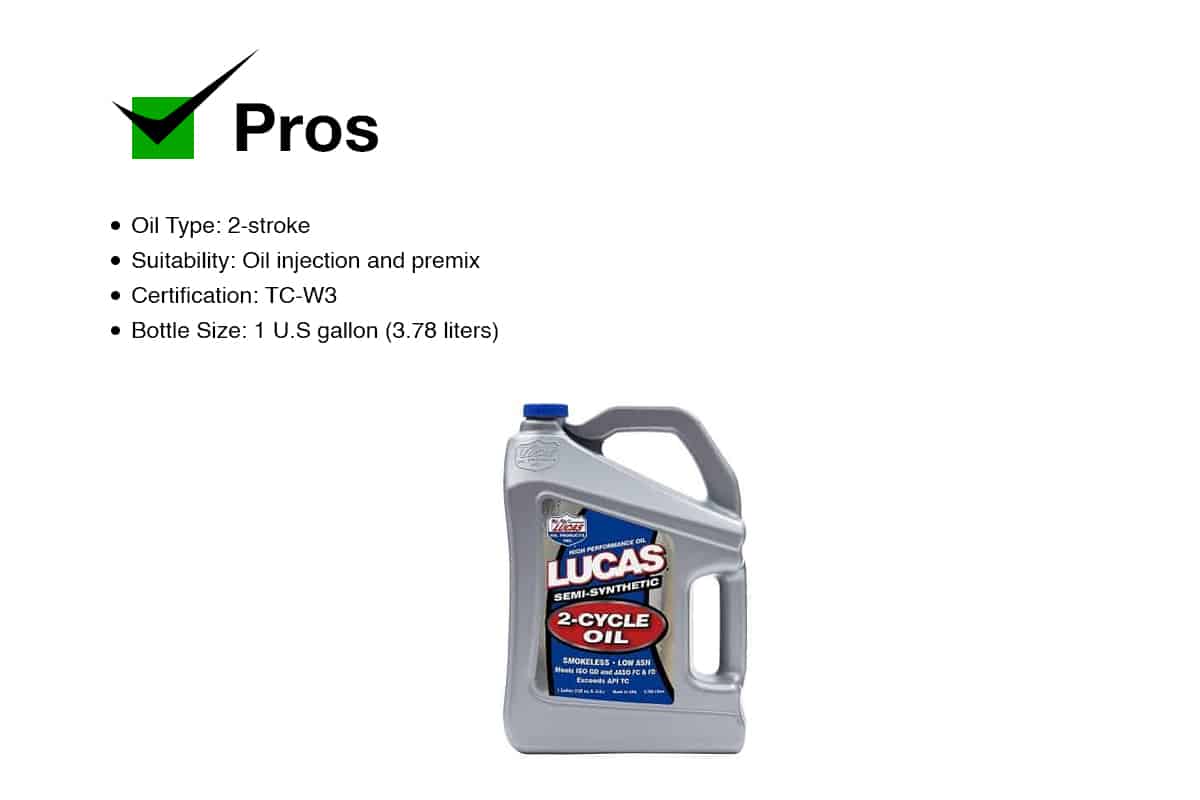
For two-stroke marine oils, you should start your search by checking out what Lucas Oil has to offer. Lucas is one of the biggest names in the lubrication game. If it has an engine, you can bet that Lucas has an oil for it. For the best marine oil for 2-stroke engines, we’d recommend the Lucas Oil Semi-Synthetic 2-Cycle Oil for consideration.
This oil has a unique blend that helps transform it into an environmentally conscious lubricant. Or at least as environmentally-conscious as an oil can be. It has a smokeless nature, which allows it to burn much cleaner than other oils, and it also boats a low ash production. Since it’s greener than other products, it makes it a far superior choice for marine applications.
It’s not just environmentally-sound either. It also offers excellent performance and increased protection, particularly for air-cooled engines. The formula is ideal for preventing carbon deposits from building up around piston rings, and inside your combustion chambers. It prevents rust, corrosion, and promises to keep your engine running better, for longer.
Naturally, this oil conforms to all regulations. It’s ISO GD and JASO FC approved, and meets and exceeds both API TC and FD standards. It’s a versatile product that can be used in two-stroke engines that are either direct oil injection or where premixing is necessary.
What’s more, this oil can actually be used for your two-stroke motorcycle too, should you have one in the garage. This makes it quite a versatile purchase. Take note though: it’s not the best choice for mixing into your weed whacker or other outdoor power tools.
Pros
Oil Type: 2-stroke
Suitability: Oil injection and premix
Certification: TC-W3
Bottle Size: 1 U.S gallon (3.78 liters)
The Best Marine Oil: A Buying Guide
While all engines are similar in nature, they have very different needs. Giant diesel engines have a different oil specification than a small outboard engine would, and what’s good for a fishing boat probably won’t be ideal for a high-performance power boat. The moral of the story is this: there’s no one-size fits all boat oil—not if you want decent results anyway.
Understanding how your boat engine works and what it has been designed for is key to finding the best oil for the job. While boat motors share similar DNA to engines found on land-going vehicles, such as their need for lubrication, and protection, there are some key differences. For example, marine vehicles are often in contact with water, salt, and other potentially troublesome materials, and it’s because of this that they often need specialized protection from their motor oils.
But before we get to that part, let’s look at some of the most important things to look out for when buying new oil for you boat.
Two-Stroke Or Four?
Marine gasoline engines come in two distinct flavors: two-stroke, and four-stroke. The different engine types have different pros and cons, but we’re not here to go into detail about that. When it come to lubrication, they have major differences.
Two-stroke engines don’t have a separate lubrication system. The oil and fuel are mixed, consumed, and burned together. The oil can be injected from a separate reservoir directly into the combustion chamber, or it can be premixed in the fuel tank. This lubricated the engine as it’s used.
Four-stroke engines have a similar lubrication system that you’d find on your car. It’s a separate, self-contained system that requires you to add oil to an oil tank, which is then routed to where it needs to go. The oil isn’t spent and consumed along with the fuel.
You should be aware of what kind of engine you have. Two-strokes are generally quite noisy and exhaust noticeable blue smoke. Four-strokes are quieter and appear to burn cleaner. At this point, if you’re still not sure what type of engine you have, you probably shouldn’t be changing your own oil.
Viscosity Level
For the best results, always follow your manufacturer guidelines. Four-stroke oil will come with a viscosity level, or oil weight, printed on the bottle. It’s always recommended that you follow your manufacturer’s advice. So, if they recommend an oil with a weight of 25W-40, then you should use an oil with the same specification.
But what does that number mean?
In short, viscosity is a fluid’s resistance to flow; in this case, the viscosity is rated at two different temperatures, since oil thickens as it cools and thins as it heats. The first number is the viscosity rating that an oil has a zero degrees Fahrenheit. It’s designated with a “W” which stands for “Winter.” The second number is the oil’s viscosity at a much higher temperature, at 212 degrees Fahrenheit, to be precise. As oil gets thinner, it’s not as useful. So, a higher second number is generally better.
That’s a very simple explanation though. For the best results, we recommend that you follow the oil requirements that your manufacturer suggests.
Protection
Apart from viscosity and lubrication, there are a number of other useful features that motor oil can do. The most important one is protecting your components from damage, and extending an engine’s lifespan. Marine engines are particularly vulnerable to rust and corrosion thanks to the wet and humid conditions that they have to operate in, but with the right oil and the right blend of additives, they can be kept at bay. Almost all marine oils will have some kind of rust-protection requirement.
Look for oils that have additives and inhibitors that have been specifically engineered to stave off rust, prevent carbon build-ups, and stop corrosion in its tracks. Rust, corrosion, and excess carbon can lead to catastrophic engine failures.
Price
Lastly, there’s the price. There are many boaters out there who will preach that oil is oil, and the differences between one brand and another are negligible. They would be right, to a degree. Any oil is better than no oil—we can all agree on that. However, those lubricants that have been specially engineered to inhibit engine wear are definitely worth paying more for.
More expensive, advanced oils will cost more, but they should extend times between maintenance. Whether you pay more for longer maintenance intervals, or pay less for oil but have to change it more often, that’s up to you. Just make sure you oil those engines!
Categories: Reviews
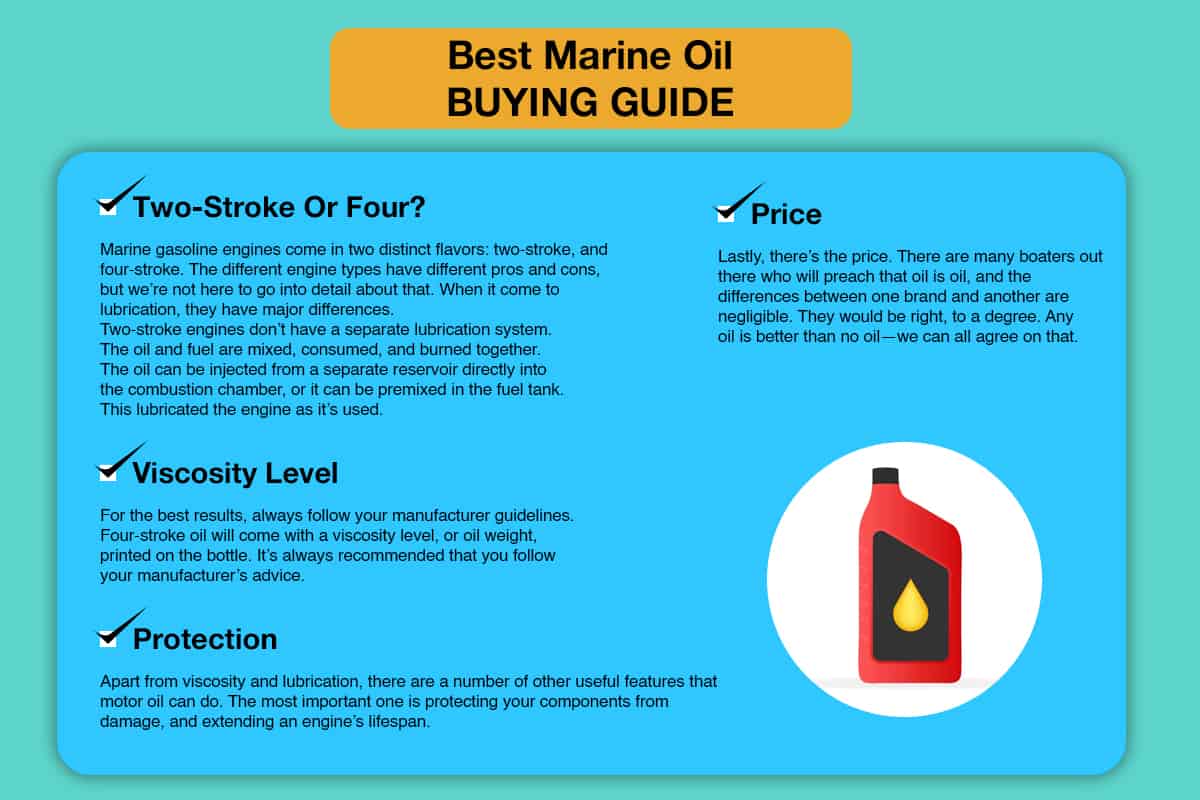
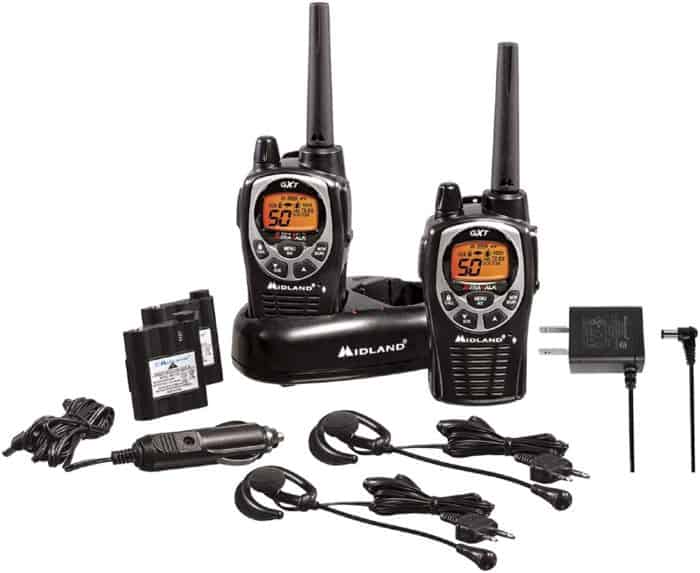











1 Comment
Arthur on December 14, 2020
I use Marine outboard TCW3 in my vehicles at 1oz per 5 gallons of gasoline. That 640:1. Over four years now with no problems and vehicles run great.